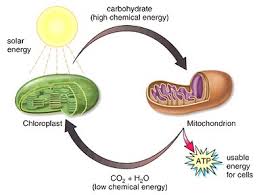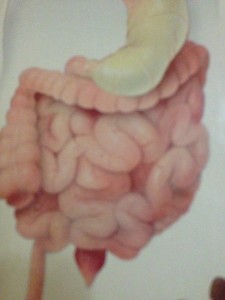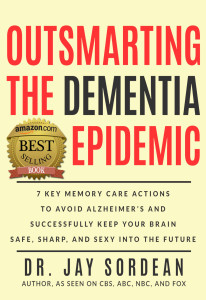Mitochondrial Disease and Dysfunction
What is so crucial about mitochondrial disease and dysfunction? Well, you may remember that the mitochondria are organelles in your cells. They make the energy packets that store and release electrical power so you can make proteins, hormones, move, talk, breathe, circulate blood, and think. Mitochondria have a counterpart in the plant world. The chloroplast. The organelle in plant cells that take carbon dioxide and water, capture energy from the sun, and pack that energy in sugar molecules. Those sugar molecules are one of the three types of food that the mitochondria then burn to create heat and energy packets.
Of course, this reminds us of how important the plant world is for our survival. The picture below by Cody Serfass sh ows this interrelationship beautifully.
ows this interrelationship beautifully.
posted Dec 22, 2014, 8:30 AM by Cody Serfass
But, as much as we need the mitochondria to work right, it can either start to not work right or be so damaged as to not work at all. It is kind of like an internal combustion engine. There has to be fuel, the burning of the fuel has to be controlled, and the energy has to be converted into a useful form. So, just like taking your car to the mechanic to figure out why the horsepower dropped, you need an expert on mitochondrial function to figure out what might be going on if you are starting to lack power. Call The Redwood Clinic for help with this.
Mitochondrial Disease and Dysfunction Diagnosis
 Definitive diagnosis of mitochondrial disease and dysfunction requires a knowledge of many steps in the process. Figuring out where in the process things aren’t working may require doing organic chemical analysis. It tells us if the steps in the process of energy production are happening as they are supposed to. Sort of like seeing if the engine is burning cleanly or producing extra pollution.
Definitive diagnosis of mitochondrial disease and dysfunction requires a knowledge of many steps in the process. Figuring out where in the process things aren’t working may require doing organic chemical analysis. It tells us if the steps in the process of energy production are happening as they are supposed to. Sort of like seeing if the engine is burning cleanly or producing extra pollution.
Mitochondrial Disease and Dysfunction and Aging
Aging is related to inflammation. Inflammation damages tissues, nerves, blood sugar balance, brain tissues, and other tissues and organs. Inflammation can damage mitochondria and degeneration of mitochondria effects all parts of the body.
The prolongation of mitochondrial health seems also associated with life span. Why is that? Caloric reduction is a major factor related to longevity. When you reduce calories and fast on occassion, your damaged mitochondria will be broken down so only healthy ones remain behind. Having only well functioning mitochondria is like having a race event with only the best running cars working. The broken down cars then don’t create wrecks and roadblocks on the race course.
Mitochondrial Disease and Dysfunction and Your Heart
The failing heart is a muscle running out of fuel, and the fuel of the heart comes from mitochondrial activity. Without adequate intake of nutrients you will have mitochondrial deterioration, according the Bruce Ames. With the high prevalence of death from heart attacks in this country it is wise to have your mitochondria checked at The Redwood Clinic to see if they might be a source of potential early mortality.
Mitochondrial Disease and Dysfunction and Bipolar Depression
Build up of acids from the energy cycle, when it is not working right, leads to higher acidity, and that is related to bipolar depression.
Mitochondrial Disease and Dysfunction and Obesity

Stomach, Small Intestine, and Large Intestine
African Americans may have an especially susceptible mitochondria that have less ability to produce heat and thus have higher levels of diabetes and prostate cancer.
Also having too much “white fat” (devoid of mitochondria) puts you more at risk for obesity and cardiovascular disease than having enough brown fat which contains lots of mitochondria that can convert the fat into energy.
Mitochondrial Disease, Dysfunction, and what to do about it
In addition to getting your mitochondrial function checked out, there are many things you can do to help support your mitochondria. Periodic exposure to cold helps your metabolism and the functioning of your energy production system — the mitochondria. While it is not for me, you could really shock your system (and stimulate your mitochondria) by joining a “polar bear club.” Taking a cold shower in the morning can also help.
Exercise helps optimize thyroid function, and thyroid hormones enhance metabolism and speed mitochondrial activity to create more energy and resultant heat.
Mitochondrial Disease and Atrazine
Atrazine is a widely used weed killer predominantly for corn. Atrazine is a mitochondrial damager — avoiding foods with atrazine is a great idea. That may mean that you have to avoid packaged manufactured “foodstuffs” if made from non-organic corn. Other studies show that Atrazine use tends to correlate with the incidence of obesity. And again, most manufactured foods are made with some kind of corn.
Herbicides work on chloroplasts and chloroplasts are like mitochondria. When you poison the mitochondria you can’t burn fat anymore. And fats, carbohydrates and proteins are what we burn for fuel.
Chronic use of alcohol can damage mitochondrial DNA through oxidative stress. Then if the liver isn’t working, you can’t clear toxins and then you age quickly.
Certain combination and single drugs can damage your mitochondria. Go to www.mitoaction.org to see which drugs are not good for your mitochondria. Drugs that damage your mitochondria include statins, antibiotics, and beta-blockers. The bacteriocidal antibiotics, quinolones, aminoglycosieds and beta lactams, are the most damaging to mitochondria. Certain things might help to support your body when taking those drugs, such as the right probiotics and NAC. Also, if possible, use the bacteriostatic antibiotics versus the bacteriocidal antibiotics.
Methyl mercury has a damaging effects on mitochondria in the brain especially. An underlying mitochondrial disorder may be a reason why vaccine-induced autism is real, as mentioned in US Federal Court.
A damage to your body due to your doctors prescriptions is called inatrogenica imperfecta by Dr. LePine. Medicine-induced disease due to bad drug combinations is quite prevalent.
Panic attacks can come from a high pH in the brain. Eg. you panic when your CO2 level increases from, for example, holding your breath a long time underwater. Due to pH drop. (Meaning that you are becoming more acidic — remember the pH scale is small numbers acid, 8 is neutral, and larger numbers are basic). Aerobic exercise may help you deal with it build up of lactic acid which is the product of the energy production without oxygen.
Mitochondrial Disease and Charles Darwin
Darwin’s illness throughout life may have been due to mitochondrial problem and a mitochondrial DNA -related problem.
In this case, arginine and citrulline may have positive benefits.
Mitochondrial Disease and Autism
Autism or other types of delayed developmental conditions may be helped by understanding the mitochondrial gene sequence as well.
Understaning the need to get oxygen into the brain and then into the mitochondria is discussed in Dr. Jay’s bestselling book, Super Brain: Maximize Your Brain Health for a Better Life. Order online at this link.
Medical research increasingly recognizes mitochondrial dysfunction as a major factor in the pathology of numerous human diseases, including diabetes, cancer, neurodegenerative diseases and ischemia reperfusion injury. So consider getting you “powerhouse” checked out at The Redwood Clinic before you “check out” for good. 510-849-1176






